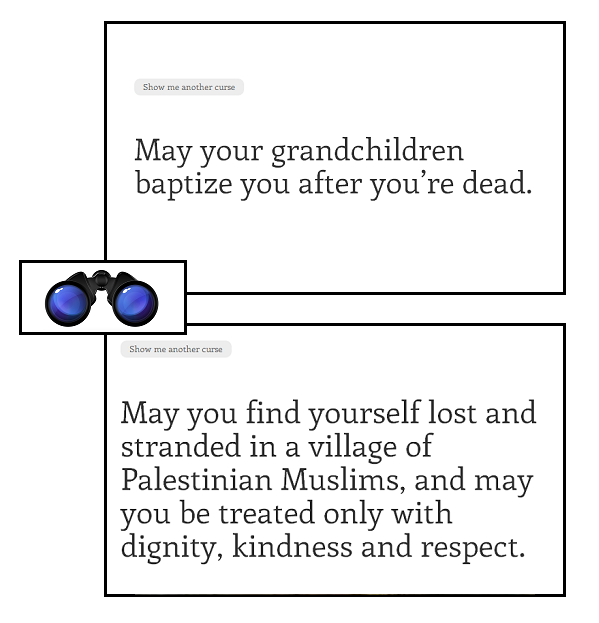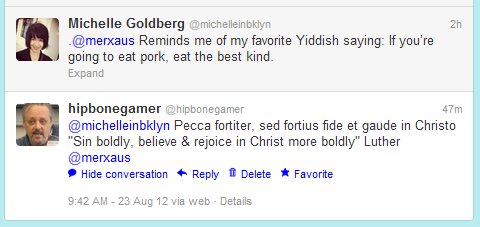Rabbis, Islam & End of Days II, also 2013 Mahdism Update, II
Tuesday, January 22nd, 2013[ by Charles Cameron — continuing my updating of Mahdist issues, also surprising parallels and oppositions ]
.
By the time you’ve learned the various signs of the times — pre-, mid- and post-trib rapture dispensationalist, preterist, Mormon, I dunno, ecological, Sunni, Shiite — the list, like Tolkien‘s Road, goes ever on — who’s on which side, and who might be somebody else’s something — you may feel as confused as I do.
**
The very first sentence of Tim Furnish‘s book, Holiest Wars: Islamic Mahdis, their Jihads and Osama bin Laden — which I may never tire of quoting — reads:
One man’s messiah is another man’s heretic.
I was rereading the amazing section on the Gharqad tree in Anne Marie Oliver and Paul Steinberg‘s book, The Road to Martyrs Square, the other day, and noticed on p. 21 yet another intriguing variant on Furnish’s point:
Even before the intifada, the figure of the Dajjal was equated by many Islamists with the Jewish Moshiach, the Messiah, as when the highly influential Pakistani Islamist Malauna Maududi claimed in the 1960s that “the stage has been set for the emergence of the Dajjal who, as was foretold by the Holy Prophet (PBUH), will rise as a ‘Promised Messiah’ of the Jews.” By the late intifada, the equation was commonplace in the West Bank and Gaza. When the Lubavitcher Hasidim in the early 1990s began to refer to Rabbi Menachem Mendel Schneerson as the Messiah, the claim had considerable effect on Palestinian Islamists. Some actually began to include Schneerson on their list of False Prophets, referring to him as “the Antichrist Liar.”
**
Compare this, however, with the Muslim Harun Yahya‘s willingness to declare his expectation of the King Messiah / Moshiach in the screen-cap below. Yahya is presumably referring to the same salvific end-times figure he elsewhere refers to as the Mahdi.
Here we have the reverse possibility to the one Furnish points to — it certainly looks as though here, one man’s Messiah is another man’s Mahdi. On one of his websites, King-Messiah.com, Yahya makes the identification of these figures from two traditions explicit:
And “King Messiah” is a particularly interesting phrase for Yahya to use — among other things, it’s the term some followers of the late Lubavitcher Rebbe Schneerson use to describe their rebbe.
**
As I pointed out two days ago in Expecting the unexpected: Rabbis, Islam, and the End of Days, there’s a whole lot going on here, and it takes patience to tease all the strands out…
One of these days I’ll have to put together an extended list of messiah / mahdi correspondences — and prophet / false prophet and christ / antichrist correspondences between competing eschatologies, too, both within specific religions and across them.
I suspect Ayatollah Muhammad Baqir al-Sadr was thinking along similar lines to Yahya when he wrote the paragraph I quoted towards the end of The Messianic Mahdist Moebius strip — or maybe Maze?:
The Mahdi is not an embodiment of the Islamic belief but he is also the symbol of an aspiration cherished by mankind irrespective of its divergent religious doctrines. He is also the crystallization of an instructive inspiration through which all people, regardless of their religious affiliations, have learnt to await a day when heavenly missions, with all their implications, will achieve their final goal and the tiring march of humanity across history will culminate satisfactory in peace and tranquility. This consciousness of the expected future has not been confined to those who believe in the supernatural phenomenon but has also been reflected in the ideologies and cult which totally deny the existence of what is imperceptible. For example, the dialectical materialism which interprets history on the basis of contradiction believes that a day will come when all contradictions will disappear and complete peace and tranquility will prevail.
The Iranian scholar Muhammad Ali Shumali, whom I also quoted, said much the same:
Imam Mahdi is not a saviour for [just] the Shias. Imam Mahdi is a saviour for all mankind…
**
Parallels and oppositions…
My language here will probably not be precise enough for mathematicians or logicians — but isn’t the thing that most closely resembles another thing its exact opposite?
And to give this already twisty rope yet another twirl… not in terms of apocalyptic, but of Jewish / Muslim relations more generally…
Here’s Pastor John Hagee — the preacher who was so far right that Sen. John McCain rejected his endorsement in the 2008 presidential campaign — talking with Rabbi Daniel Lapin about Muslims being blessed, and how their five-times-daily prayers are particularly listened to by God:
These unpredictable “outlier” nuances and their attendant shocks and surprises are ongoing…
**
The “signs” graphic at the head of this post is from a post titled Preparing for the Second Coming on LDS Why? — you can download their answers for teens in Chapter 12 of the book The Big Picture. It begins:
Imagine it’s a bright and sunny afternoon, and as you drive down the road with your parents you look up and notice that the sky looks different than normal. The clouds are luminescent, bright, and heavenly. Suddenly, without warning, the sky seemingly bursts open and the veil between heaven and earth is split. Trumpets start sounding from the sky, and you see above you the most glorious being your mind could ever conceive of descending out of heaven and touching down on earth — Jesus Christ in all His glory…
That’s a sign that might be hard to miss…









